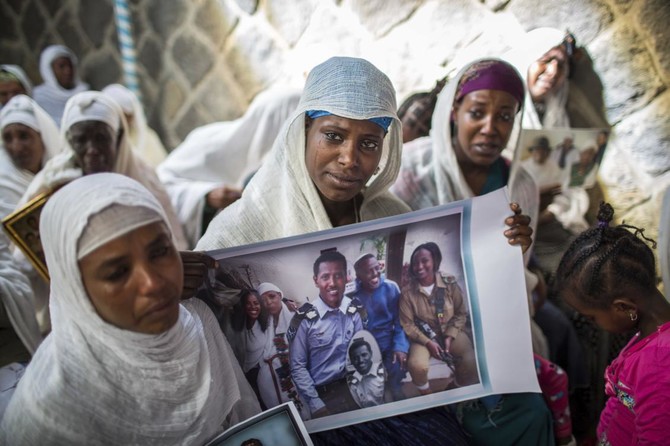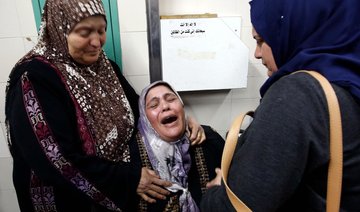JERUSALEM: Zemenech Bililin has not seen her sisters in more than a decade, since she immigrated to Israel from Ethiopia with part of her family. Now a 19-year-old infantry soldier in Israel’s military, Bililin says she is outraged that she is fulfilling her duties as a citizen but the state is shirking its responsibility to bring her relatives to Israel.
Bililin’s family is one of hundreds that have been split between Israel and Ethiopia over what they say is an inconsistent immigration policy, and whose fate hinges on an Israeli government decision over whether to allow for their reunification. Ethiopians in Israel say the bitter public feud to unite with long-lost relatives has exacerbated a feeling that the state discriminates against its Ethiopian minority.
“It’s shocking in my opinion. They only do this to us, to our ethnicity,” said Bililin. “The state should take responsibility and stop abandoning the Jews.”
The issue faces a critical juncture next week, when the government is tentatively scheduled to decide whether to allocate funding to bring as many as 8,000 Ethiopians to Israel to reunite with their families.
Israel clandestinely airlifted thousands of Ethiopian Jews from the country in the 1980s and 90s, spending hundreds of millions of dollars to bring the ancient community to the Jewish state and help them integrate. About 140,000 Ethiopian Jews live in Israel today, a small minority in a country of over 8 million. But their assimilation hasn’t been smooth, with many arriving without a modern education and then falling into unemployment and poverty.
As far as Israel is concerned, the drive to bring over Ethiopia’s Jewish community officially ended in the 90s, but amid pressure from lawmakers and family members, successive Israeli governments have opened the door to immigration by a community of descendants of Ethiopian Jews who were forced to convert to Christianity under duress about a century ago.
Although many of them are practicing Jews, Israel doesn’t consider them Jewish, meaning they are not automatically eligible to immigrate under its “law of return,” which grants automatic citizenship to anyone with at least one Jewish grandparent. Instead, the government must OK their arrival.
Community members have been permitted to immigrate over the last two decades in limited bursts that have left hundreds of families torn apart.
Nearly 8,000 people in Ethiopia are hoping to immigrate, among them Bililin’s sisters, who as married women applied to immigrate separately.
In 2015, Israel agreed in principle to bring over the remaining Ethiopians who have Israeli relatives, vowing that it would be the last round of Ethiopian immigration and clearing the way for the arrival of 1,300 people last year.
Israel says it has continued to greenlight the community’s immigration on humanitarian grounds but it also has set a slew of requirements on those waiting in Ethiopia, in part to prevent what could be an endless loop of immigration claims.
Avraham Neguise, an Ethiopian-Israeli lawmaker in the ruling Likud party who chairs the Israeli parliament’s Absorption and Diaspora Committee, accused the government of dragging its feet and in turn damaging the Ethiopian community’s already brittle relationship with the state.
“The government is pursuing a discriminatory policy by not having the remaining Ethiopian Jews immigrate,” he said. “There’s no doubt that it harms the community’s trust.”
While Ethiopians have made strides in certain fields and have reached the halls of Israel’s parliament, many complain of racism, lack of opportunity, endemic poverty and routine police harassment.
Those frustrations boiled over into violent protests three years ago after footage emerged of an Ethiopian-Israeli in an army uniform being beaten by police. Thousands of Ethiopian Jews and their supporters blocked main highways and clashed with police in a bid to draw attention to their plight, including what they say is unchecked police brutality against their community members.
Activists have been lobbying the government to approve the immigration, penning letters to Israeli officials and sharing their poignant stories of separation in parliamentary committees. They see the issue as an easily solvable one that has needlessly shattered families and marooned people in a troubled country.
“Daughters are getting married in Israel without their mothers at their side. Sons are going to war and not returning without having their fathers there to bury them. We’re talking about human lives here,” said Alisa Bodner, a spokeswoman for Struggle for Ethiopian Aliyah, an activist group.
The community expected to see funding for immigration in the proposed budget, which is expected to come up for a vote as early as next week. But they were stunned when it was absent from preliminary versions of the budget.
The anticipated estimated cost of flying all 8,000 people to Israel along with housing and social services is roughly 1.4 billion shekels, or about $400 million, a sizeable figure but a tiny fraction of a nearly 500 billion shekel ($143 billion) national budget, according to an official from the finance ministry. The official spoke on condition of anonymity because she was not authorized to discuss a budget that has not yet been passed.
Neguise and the activists are engaged in a last-minute push to have the families’ plight included in the upcoming budget and to do so the Israeli government must vote on the issue, which could happen on Sunday. However, it is unclear whether the government would agree to bring all of the Ethiopians to Israel, or just limited numbers as in the past.
Regardless of the outcome, hundreds of people are expected to protest outside parliament the following day demanding action.
Israel’s Finance Ministry said it was up to the government to decide on the issue. There was no immediate comment from Israel’s prime minister’s office.
The Ministry of Immigration and Immigrant Absorption said “the subject of the continuation of Ethiopian immigration is on the government’s agenda.” But with the government embroiled in a coalition crisis over separate issues, the plight of the Ethiopians may not be its top priority.
“It’s intensely painful. I miss them like crazy,” Bililin said about her sisters. “(The government) doesn’t understand that pain.”
Ethiopian-Israelis decry family separation as discriminatory
Ethiopian-Israelis decry family separation as discriminatory

UN votes to end mission in Yemeni city of Hodeida

- The resolution approved Tuesday, which was sponsored by Britain, stipulates that the UN mission in Hodeida — known as UNMHA — must close as of March 31
UNITED NATIONS, United States: The UN Security Council voted Tuesday to terminate a mission that tried to enforce a ceasefire in war-torn Yemen’s port city of Hodeida.
“Houthi obstructionism has left the mission without a purpose, and it has to close,” said Tammy Bruce of the US delegation, one of 13 on the 15 member council to support ending the mission’s mandate.
The UN mission is now scheduled to conclude in two months.
Yemen’s internationally recognized government is a patchwork of groups held together by their opposition to the Iran-backed Houthis, who ousted them from the capital Sanaa in 2014 and now rule much of the country’s north. They also hold Hodeida.
The Houthis have been at war with the government, backed by a Saudi-led coalition since 2015, in a conflict that has killed hundreds of thousands of Yemenis and triggered a major humanitarian crisis.
Since 2021 the Houthis have periodically detained UN staffers and still hold some of them.
The resolution approved Tuesday, which was sponsored by Britain, stipulates that the UN mission in Hodeida — known as UNMHA — must close as of March 31. It has been there since 2019.
Russia and China abstained from the vote.
“For six years, UNMHA has served as a critical stabilizing presence” in the region and “actively deterred and prevented a return to full scale conflict,” said Danish representative Christina Markus Lassen.
“The dynamics of the conflict have evolved, and the operating environment has significantly narrowed as UN personnel have become the target of the Houthis’ arbitrary detentions,” Lassen said.
The war in the poorest country in the Arabian peninsula has triggered the worst humanitarian crisis anywhere in the world, the United Nations says.
It expects things to get worse in 2026 as hungry Yemenis find it even harder to get food and international aid drops off.













